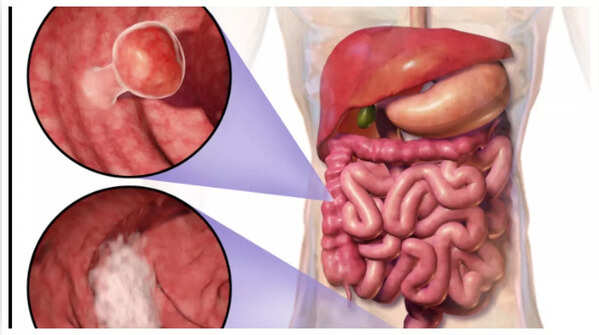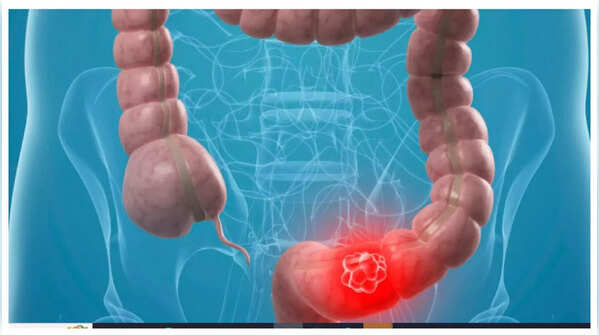Colon cancer, also known as colorectal cancer, begins in the colon or rectum, the final section of the large intestine. It frequently starts as benign clumps of cells called polyps, which can become cancerous over time. While most cases occur randomly, factors like family history, obesity, and lifestyle choices can elevate the risk. The onset of colon cancer is most common after age 50, and early symptoms are often subtle, mimicking digestive problems or stomach infections. Recognizing these signs is crucial for early detection and treatment.

A significant indicator of colon cancer is a shift in bowel habits, including:
These changes might seem insignificant and be easily attributed to diet or stress. However, persistent bowel changes lasting more than a few days, or recurring frequently, could signal a growing tumor disrupting normal bowel movements.

The presence of blood in the stool should always warrant medical attention, regardless of whether colon cancer is suspected. This can manifest as:
In some instances, the bleeding is minimal and undetectable without testing but can lead to anemia over time. While blood in the stool can result from hemorrhoids or infections, excluding colon cancer is imperative, especially if it's a recurring issue or accompanied by other symptoms.

Persistent abdominal discomfort is another commonly overlooked early symptom. This may present as:
Such discomfort can be mistaken for indigestion or minor digestive problems like constipation. However, if the pain persists and is unrelated to dietary or lifestyle changes, it could indicate a tumor causing irritation or blockage in the colon.

Unexplained and excessive fatigue and weakness can be a subtle indicator of colon cancer, especially when paired with other symptoms. Slow, undetected bleeding in the colon can lead to iron deficiency anemia. A reduced number of red blood cells hinders oxygen transport, resulting in fatigue, shortness of breath, and weakness. While easily dismissed as stress-related, these symptoms should be investigated.

Losing weight without trying is a common symptom of many cancers, including colon cancer. When the body combats cancer, the immune system is continuously activated, and tumors can interfere with digestion and appetite. Significant weight loss without changes in diet or exercise necessitates medical evaluation. Though it often appears later, it can sometimes be an early warning sign.
Disclaimer: This article is for informational purposes only and does not substitute professional medical advice. Always consult with a qualified healthcare provider for any health concerns.
Sources:

Maintaining a well-balanced and nutritious diet plays a crucial role in overall health.

If you experience any of the mentioned symptoms, it's crucial to seek medical attention promptly.

A cancer diagnosis can have a profound mental impact, triggering emotions like shock, disbelief, fear, anxiety, and concerns about treatment, finances, and mortality.

If you experience any of these symptoms, consult a doctor promptly. Do not delay seeking medical attention.

Regular exercise can help prevent various ailments, including cancer.

Ensure you are vigilant about these symptoms.

If you notice these signs, consult a doctor for proper evaluation.

Do not ignore these warning signs.

Identify potential symptoms before it's too late.
Newer articles
Older articles
 Prasidh Krishna Targets Sharper Bowling Lengths, Lower Economy Rate After Test Performance Review
Prasidh Krishna Targets Sharper Bowling Lengths, Lower Economy Rate After Test Performance Review
 'Ta Ra Rum Pum' Director's Tweet Fuels F1 Movie Comparisons, Ignites Fan Frenzy
'Ta Ra Rum Pum' Director's Tweet Fuels F1 Movie Comparisons, Ignites Fan Frenzy
 Rishabh Pant's Fearless Batting Style Hailed by Greg Chappell as Game-Changing: Ex-India Coach Compares Him to Gilchrist After Twin Centuries vs. England
Rishabh Pant's Fearless Batting Style Hailed by Greg Chappell as Game-Changing: Ex-India Coach Compares Him to Gilchrist After Twin Centuries vs. England
 NASA-ISRO successfully deploy world’s largest radar antenna in orbit; a milestone in Earth observation
NASA-ISRO successfully deploy world’s largest radar antenna in orbit; a milestone in Earth observation
 Samantha Ruth Prabhu's Throwback Thursday: Actress Shares Rare Teenage Photo
Samantha Ruth Prabhu's Throwback Thursday: Actress Shares Rare Teenage Photo
 Blackcaps to Face Packed International Schedule: Australia, England, West Indies, and South Africa to Tour New Zealand
Blackcaps to Face Packed International Schedule: Australia, England, West Indies, and South Africa to Tour New Zealand
 New York Assemblyman Zohran Mamdani's Style Guide: 5 Fashion Tips for the Modern Man
New York Assemblyman Zohran Mamdani's Style Guide: 5 Fashion Tips for the Modern Man
 Royal Challengers Bengaluru Dethrone Chennai Super Kings as IPL's Most Valuable Franchise
Royal Challengers Bengaluru Dethrone Chennai Super Kings as IPL's Most Valuable Franchise
 Prithvi Shaw Admits to Losing Focus, Wrong Friends Led to Cricket Career Setback
Prithvi Shaw Admits to Losing Focus, Wrong Friends Led to Cricket Career Setback
 Pant Reaches Career-Best Ranking, Bumrah Stays Top in Latest ICC Test Update; Root Still Leads Batters
Pant Reaches Career-Best Ranking, Bumrah Stays Top in Latest ICC Test Update; Root Still Leads Batters